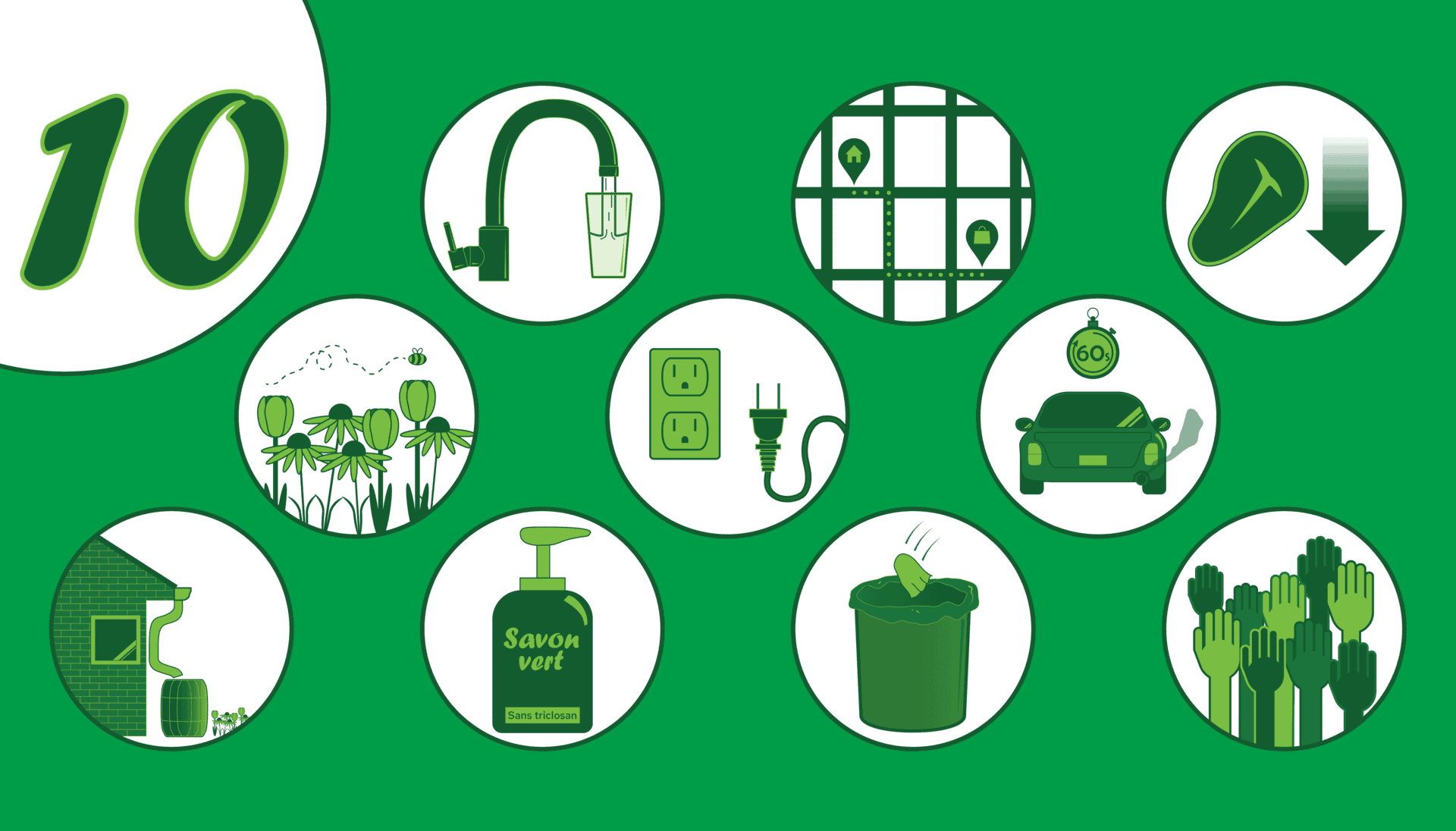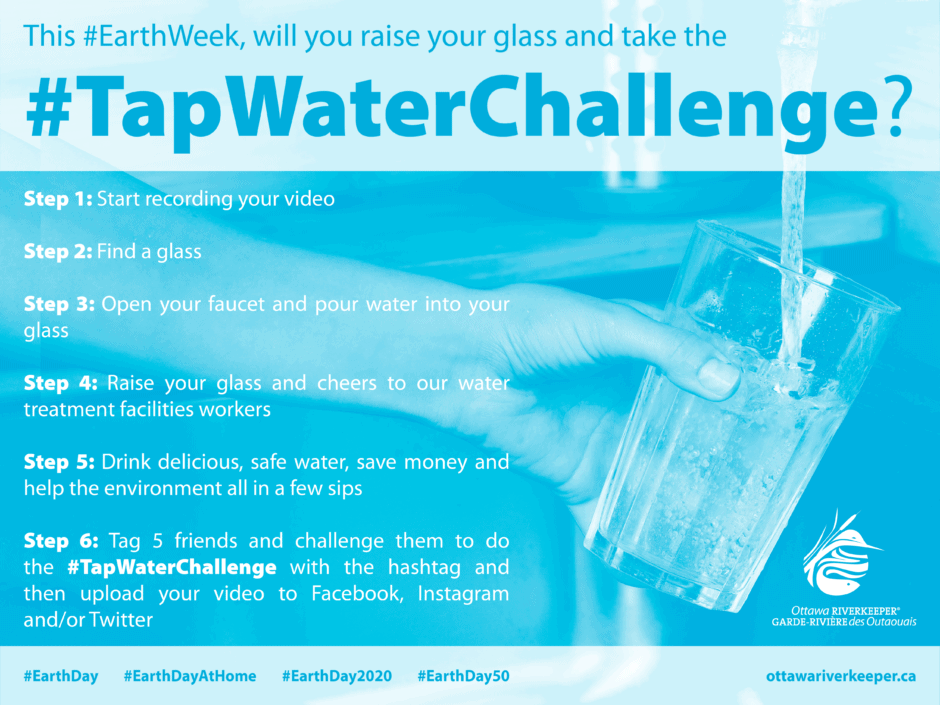Posted: April 20, 2020
10 Ways to Protect the Environment during the COVID-19 Pandemic

In the spirit of coming together, the environmental organizations of Ottawa Riverkeeper, CREDDO, Ecology Ottawa, and EnviroCentre have put their heads together to provide the communities of the National Capital Region and beyond with 10 ways to protect the environment during the COVID-19 pandemic.
Happy Earth Week! In an unprecedented time like the COVID-19 pandemic, many of us are confined to our homes with few opportunities to go outside. Despite global changes to our lifestyles, we can still protect the environment from indoors or our backyards!
1. Eliminate plastic water bottles and take the #TapWaterChallenge.
Media outlets have reported that some people have begun stockpiling plastic water bottles. However, bottled water is more expensive, less safe and more harmful to our ecosystems than tap water. The Ottawa River watershed water treatment facilities are world-class and we are fortunate to have water treatment professionals who provide us with a constant and safe supply of clean drinking water. That’s why we are inviting you, fellow residents of the Ottawa River watershed, to take the #TapWaterChallenge!

2. Support your local businesses and reduce your carbon footprint by buying local products.
COVID-19 has greatly affected many small businesses. Instead of ordering products online to be shipped from across the continent, consider buying from local businesses. It is a great way to support your own community and local economy while reducing the amount of greenhouse gases we produce.
3. Reduce your meat consumption to protect the planet and be more healthy.
The livestock sector accounts for 14% of greenhouse gas emissions and 80% of total anthropogenic land use, which have been shown to exacerbate the global climate crisis and contribute to deforestation and decrease biodiversity. Furthermore, the nutrients in manure (particularly phosphorus) can contribute to eutrophication of surface water systems which can lead to algae proliferation, fish death (as a result of oxygen depletion) and water quality degradation. The adverse health effects of beef and pork have been well documented and health professionals have recommended consuming less of these meats.
4. Plant native or acclimatized plants in your yard to promote biodiversity.
Many of us enjoy planting gardens in the spring, but did you know that your garden can also work to limit the amount of runoff entering our local waterways? Planting a rain garden using native plant species is a great way to help limit the amount of pollution that makes its way into the river. Rain gardens help by absorbing excess rain and stormwater and filtering contaminants before they can enter the river. Using native plant species helps to promote natural biodiversity and can even attract pollinators.
5. Reduce your electric bill and your energy consumption by unplugging your unused electronics.
Did you know that when your TV and computer are turned off they still consume electricity, spending your money and increasing your environmental impact? Taking the time to unplug your unused electronics can save you some dollars and reduce your effect on nature.
6. Improve your home infrastructure by diverting rainwater away from our storm and sewer systems.
Using a downspout extension or diverter will allow you to redirect rainwater from your gutters away from paved surfaces, towards your garden or lawn where the water will be absorbed decreasing the amount of runoff that finds its way to the river. If your downspout is located too far from your lawn or garden (or if you don’t have much of a lawn), you can install a rain barrel under your downspout, which will collect the rainwater and lessen the amount of runoff.
7. Review the chemicals in your cleaning products in your home to protect our waterways.
Many of the cleaning products we use in our homes (like soaps, shampoos, dishwasher detergents, etc.) contain chemicals, such as phosphorus, nitrogen, and ammonia, that can harm our rivers and lakes. While our waste water treatment facilities do a great job of removing most contaminants, some, like triclosan, which is toxic to aquatic organisms, still end up in our rivers and negatively impact sensitive freshwater systems. As we are taking every precaution to make sure our homes are clean during the COVID-19 pandemic, this is a good time to review the chemicals in our cleaning products and reduce the harmful chemicals where we can to lessen our impact on our waters.
8. Avoid clogging our sewer systems by not flushing disinfecting wipes (even those labelled as flushable) down the toilet.
People are more concerned with cleanliness at home now and rightfully so! That being said, disinfecting wipes, even those that are labelled as flushable, should never end up in our toilets. They do not decompose in our sanitary sewer system and flushing this material causes damage to the sewer system and may even cause backups in your own home. Please throw them out in the garbage instead!
9. Avoid idling your car for more than 60 seconds.
Avoid idling for more than 60 seconds; in 5 minutes you burn the same energy as a 60-watt light left on for 24 hours!
10. Donate to, volunteer for or become a member of a local environmental organization.
Even during the COVID-19 pandemic, environmental organizations on both sides of the Ottawa River in Quebec and Ontario continue to work towards making our world more sustainable, reduce our ecological footprint, and protect ours and plants and animals’ rights to clean freshwater systems. Without the support of concerned citizens such as yourself, the work of Ottawa Riverkeeper, CREDDO, Ecology Ottawa, and EnviroCentre would not be possible. Consider donating, volunteering or becoming a member of our organizations!
10Things_COVID19_EN< Previous post Next post >
